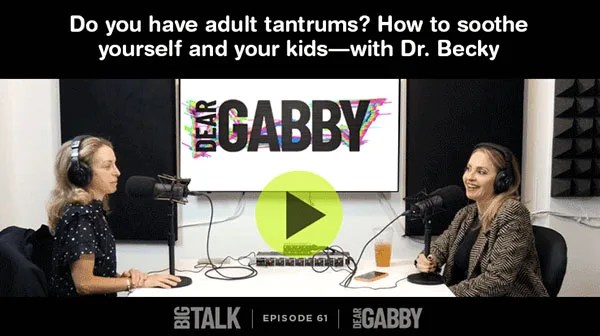“Microwaaaaaaave!!!!!” my 3-year-old son screamed. This was one of his most impressive tantrums!
His cheeks were red, his limbs were flailing and tears were spilling down his reddened face. My little guy was heated! You see…
Oliver had wanted his waffle microwaved. And his noncompliant mama — that’d be me — had toasted it instead.
In this moment of total toddler meltdown, my inner guide whispered to me.
Sometimes, I hear messages from angels or spirit guides. Other times, I channel mentors or ancestors who have passed over to the other side.
gabby
But in the midst of Ollie’s waffle woes, I heard the voice of Dr. Becky Kennedy: “Take Oliver to a smaller space and sit with him.”
You’ll hear about Dr. Becky’s GENIUS advice for soothing children (and yourself!) in the midst of tantrums on today’s episode of the Dear Gabby podcast.
Because… Dr. Becky is in the house!

All of my mom friends were so jealous when they heard I was sitting down with this revered clinical psychologist. Dr. Becky gives the BEST parenting advice.
tantrums rx
All of my mom friends were so jealous when they heard I was sitting down with this revered clinical psychologist. Dr. Becky gives the BEST parenting advice.
But the truth is, this episode isn’t just for people who care for kids. Whether you’re the parent of a toddler (hello, tantrums!), want to feel more sturdy in the presence of your own big emotions, or simply want to foster more secure relationships, this episode has beautiful takeaways for you.
listen to this episode to learn:
- How you can mend relationships with everyone in your life (Dr. Becky calls this “the repair,” and it’s changed the way I relate to my loved ones)
- What every new parent REALLY needs (forget the freaking swaddle and listen to this!)
- The simple thing you can say to a loved one to help them feel less fearful in a trying situation
training for tantrums
As I share in this episode, working as a motivational speaker was actually good training for becoming a mom. Speaking onstage in front of thousands of people, I had to learn to co-regulate with the audience. In other words, I had to create an environment that felt secure.
As I share in this episode, working as a motivational speaker was actually good training for becoming a mom. Speaking onstage in front of thousands of people, I had to learn to co-regulate with the audience. In other words, I had to create an environment that felt secure.
At my events, audience members bravely step forward during the Q&A sessions and bring up big issues that are weighing them down. And often, they speak about traumas that can be triggering to everyone in the room.
To make sure the energy of the entire audience doesn’t tank, I use some techniques to help people feel regulated and safe. And if I can do this with hundreds of people, I can do it with one toddler!
self-care & soothing
In today’s episode, I open up about the ways I make Ollie—and those in the super attractor community—feel safe, seen, soothed and secure. These techniques don’t just apply to taking care of a child or someone else; you can use them to take better care of yourself.
In Chapter 9 of my newest book, Happy Days: The Guided Path from Trauma to Profound Freedom and Inner Peace, I write:
At first I thought I was reading [parenting books] only to strengthen my bond with Oliver, but I came to see how I could apply them to myself. I could become my own internal parent and heal my past attachment wounds by respecting and honoring my inner child parts by applying the same methods I would offer to my son.
-Happy Days, Page 176
the thing is, taking care of yourself and taking care of your child aren’t just related-they are inextricably linked
As Dr. Becky shares in this episode, someone recently came up to her and said, “I’m on to you! You’re in the business of helping adults heal and feel more grounded and sturdier. And you just happened to get our attention with a topic we care about, which is our children!”
And indeed, Dr. Becky is a healer to all—children, adults, parents, people who don’t have or don’t want kids … The techniques she shares can help us all get a better grasp of our emotions.
no judgment!
Throughout this episode, Dr. Becky and I keep circling back to a theme: We do not judge you as a parent … and you should not judge yourself! There are many different ways to parent.
Some people have a stack of dog-eared books from child psychologists on their bedside. Others haven’t read a single tweet about child-rearing or toddler tantrums. And guess what? No matter which type of parent you are, you’re doing just fine.
There is no wrong place to be in your parenthood journey, and there’s no definitively right place, either. As Dr. Becky says in this Big Talk, sometimes her husband teases her, “You should follow Dr. Becky on Instagram! I think you’d really love her advice.” (Oh, and by the way … my husband has told me to “read a Gabby Bernstein book,” too!) Spiritual teachers, clinical psychologists—everyone needs a little help feeling more sturdy from time to time.
Hear me when I say this: Whether you’re the parent to a child, in the midst of reparenting yourself, or just want to feel more at peace with your adult tantrums, you are in the right place.
Now, press play and let the profound shifts begin for you and your child … and your inner child! I welcome all of you to this important conversation.
get more gabby
free meditation for healing relationships
- For more tips on how to self-soothe, check out the video below!
- Try my gabby coaching app for free —get access to hundreds of meditations, lessons and talks all in a beautifully designed app. Start your free trial to unlock your 7-day manifesting jumpstart!
- For a deeper dive check out my books.
- If you feel you need additional support, please consult this list of safety, recovery and mental health resources. I’m proud of you for your commitment to self-care.
disclaimer
This podcast is intended to educate, inspire, and support you on your personal journey towards inner peace. I am not a psychologist or a medical doctor and do not offer any professional health or medical advice. If you are suffering from any psychological or medical conditions, please seek help from a qualified health professional.
